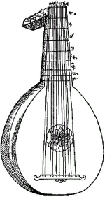Baroque Music
Baroque too is a term that is really only used for history of art, not political history. The word baroque means something that is a little exaggerated, capricious or overly decorated. It refers to the shapes of the furniture and architecture of the era. Sometimes scholars have claimed that the exaggerated shapes can be connected with the strong, powerful monarchs of the time. If you have absolute power, you might feel a bit proud and willful and that might lead you to want your palaces and interior decoration to mimic that power. I don’t know.
All I know is that the music of the time was exquisite and it’s probably my favorite classical music. This was also the time of the major geographical discoveries and the beginning of the colonisation, but it was also the time of the birth of natural science.
For many people Bach (1675-1750) is the greatest of all composers. I can only agree.
Bach belonged to a family of professional musicians, in fact the fifth of seven generations of musicians and composers. He was the one who lived to be the most famous of all, but not the only one who became famous for his music.
He was born in Eisenach in Germany, where his father was a successful violin player. His childhood was filled with music. However at the age of nine he was orphaned and was forced to move to a 24-year-old brother who lived about 50 km away.
The brother wasn’t exactly thrilled to get another mouth to feed and it’s been said that the boy was treated badly in his new home. On the other hand, his brother was an organ player so the boy’s instruction in music could continue. After five years in his brother’s home, Bach moved to Lüneburg, where he was employed as a singer in a choir. In his spare time, he studied the organ, the harpsichord and the violin, and he began to compose.
A few years later he was hired as an organ player in Thüringen, where he worked for four years. Later he worked as an organ player in other places, until he was hired by Prince Wilhelm Ernst of Sachsen-Weimar. Bach played the violin in an orchestra, led the chamber musicians, composed and taught music if he was required to. Around this time he married his cousin Maria Barbara Bach.
When the prince married a woman who didn’t appreciate Bach’s music, he was hired in Leipzig, where he stayed until his death at the age of 65. His wife had died and he’d married a woman by the name of Anna Magdalena Wilcken. With his two wives he had a total of nineteen children, of which nine survived him. Two of his sons eventually became quite famous composers too.
It seems the old man was quite hard to get along with, and most people who knew him had no idea how great he’d become, especially after his death.
I think it’s pretty amazing that many of his pieces were created simply because he had signed a contract where he promised to provide a new masterpiece every Sunday for mass. How could anyone create such wonderful music, under such circumstances? Apparently, Johann Sebastian Bach could, as anyone who listens to his music can testify to.
Baroque music wasn’t just Bach. He had many colleaues. I can only mention a few. Some of them I’ll go into in detail. In Great Britain, one of the big names was Henry Purcell (1659-1695). From Italy: Monteverdi (1567-1643) and Antonio Vivaldi (1678-1741). In France the most famous names were Francois Couperin (1668-1733) and Jean Philippe Rameau (1683-1764). Both created exceptionally beautiful music.
Antonio Vivaldi (1675-1741)
Vivaldi worked about the same way as Bach did. He was under contract to create oratories and conserts for various religious holidays, like the celebration of local saints.
Among his work, the instrumental music is most famous, though he also wrote 49 operas and other types of music throughout his life. Most famous among his work is probably The Four Seasons, a series of four violin concerts. If you’ve heard something by Vivaldi, that’s probably it.
Vivaldi also worked as a music teacher in a home for orphaned girls. He trained and led an orchestra that almost exclusively consisted of teenage girls, which was quite unusual in those days.
Antonio Vivaldi was born in Venice. His father was a violinist in St Mark’s church. The boy was trained at a seminar and became a priest. Due to poor health he rarely worked in his profession, and dedicated his life to composing music. Between 1704 and 1740, he worked as a conductor, composer, teacher and in various ways he led the work at the Pietá conservatory.
Because of his red hair he was called the Red Priest. Johann Sebastian Bach was a great admirer of Vivaldi and he adapted several of the Italian’s pieces.
After his death, Vivaldi and his work were forgotten and weren’t rediscovered until in modern times. Today his work is considered an important transition between baroque and classicism.
Except for Vivaldi, the greatest were from Germany/Austria. Two of J S Bachs sons, Wilhem Friedemann (1710-1784) and Carl Philipp Emanuel ((1714-1788), were among them, and so were Georg Philipp Telemann (1681-1767), Georg Friedrich Handel (1685-1759) and Christoph Willibald Gluck (1714-1787). Slightly less well known were Johann Pachelbel (1653-1706) and Dietrich Buxtehude (1637-1707).
Christoph Willibald Gluck (1714-1787)
What Gluck is best known for, are his operas. He would change the character of the genre forever. More than a century earlier an Italian by the name of Monteverdi had reformed opera, but since then the musical drama had degenerated. Gluck wanted to restore it to Monteverdi’s standard and evolve and improve it.
To achieve that, you could say it was useful to have Marie Antoinette, wife of Louis XVI, as a protector. Gluck had taught the queen music and she’d learned to appreciate his music.
The degenerate form of opera had allowed the singers to take over. They were the superstars of the era and they didn’t like to submit to a director or other superiors. Gluck put the spoiled divas in their place. He shortened the arias, reduced the number of arias and developed the instrumental accompaniment of the recitatives. Another change was that the ouverture became a part of the opera itself. Gluck chose librettos with realistic emotions and character development.
Christoph Willibald Gluck was the son of a game keeper in an estate close to Nuremberg. He studied music for the jesuits. At the age of 18 he was a traveling musician who also sang in the churches along the roads and played the violin at carnivals. Eventually he settled in Vienna, where his father’s employer, prince Lobkowitz hired him for his private orchestra.
Later he traveled to Italy with another prince, studied and wrote Italian opera in Milan, visited other European countries, among them Great Britain, where he failed at impressing Handel. After being away for about twelve years, he returned to Vienna.
In the 1740’s Benjamin Franklin invented an instrument called a glass harmonica. It consisted of 35 round glasses. The invention was based on a construction by Gluck. He once performed a concert on 36 drinking glasses and he claimed that whatever could be played on a violin or a harpsichord, could also be played on a glass harmonica.
Gluck’s first opera according to his new rules was Orfeo ed Euridice. It’s been said that it’s the only one of his operas that is remembered today. However, in later years, I’ve seen Alceste/Alcestis and a few others mentioned. Alcestis is an opera with a happy ending for a change.
Gluck’s operas are among the oldest still being performed. That has to mean he succeeded with his reformation of the genre.
Here are a few pieces by some of these composers (Bach, Vivaldi, Gluck) to give you a sense of how baroque music sounded.
Air
Aria
Aria 2
Konzert 1
Konzert 2
Konzert 3
Andante
Gavotte
Dance

Lute
